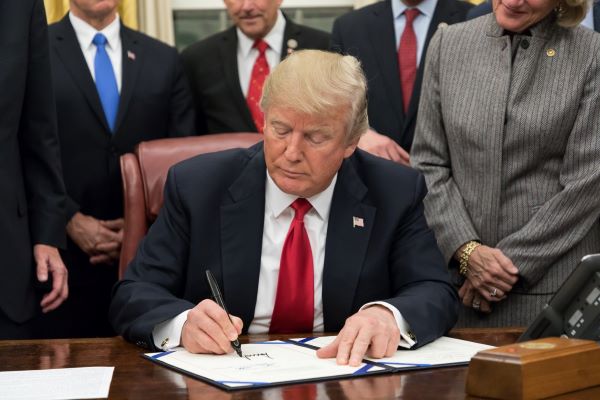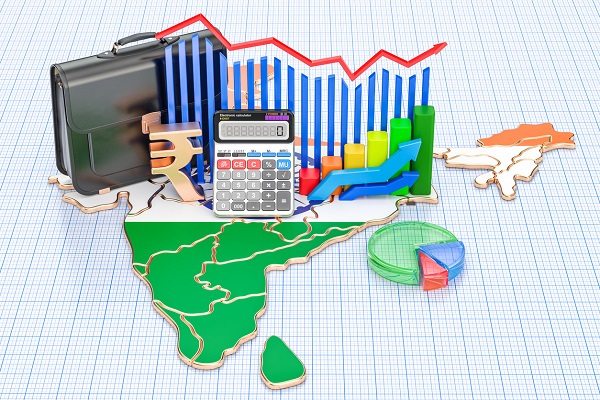.png)
Trump Warns Of Tariff Hike On Global Trade Partners From August 1
A newsletter designed to prepare you for the day, offering a concise summary of overnight developments and key events ahead that could influence your workday.

July 8, 2025 at 1:18 AM IST
QUICK SNAPSHOT
Global Sentiment: Risk-off
Factors: Trump Tariff Letters
TODAY’S WATCHLIST
- RBA Interest Rate Decision
- US Fed's Balance Sheet
THE BIG STORY
US President Donald Trump intensified his global trade offensive on Monday by notifying 14 nations from major suppliers like Japan and South Korea to smaller exporters such as Thailand, Serbia, and Tunisia that sharply higher US tariffs will take effect on August 1. The letters, while offering an opening for further negotiations, carried a firm warning: any retaliatory measures would be met with equivalent US action. Trump also signed an executive order extending the original Wednesday deadline, giving trade partners a few more weeks to reach new agreements. So far, only the UK and Vietnam have secured deals.
The move signals a new phase in Trump’s months-long campaign to reshape global trade, which has already unsettled financial markets and put central banks on edge. Tariff rates for South Korea will remain as initially outlined, while Japan’s rate has increased by one point from the April 2 baseline. Trump also introduced a new threat of an additional 10% levy on imports from countries aligning with the BRICS bloc, accusing them of supporting “Anti-American policies.” Japanese Prime Minister Shigeru Ishiba responded on Tuesday, saying Tokyo remains committed to reaching a mutually beneficial trade deal with Washington.
DATA
Japan’s current account surplus rose to ¥3,436.4 billion in May 2025, up from ¥2,949.5 billion a year earlier, surpassing market expectations of ¥2,940 billion. The services account returned to surplus at ¥201.1 billion, reversing a ¥51.6 billion deficit, while the goods trade deficit narrowed sharply to ¥522.3 billion from ¥1,098.6 billion. This was driven by a modest 1.4% drop in exports compared to a steeper 7.5% fall in imports, indicating some resilience in external demand.
In Europe, German industrial production rose by 1.2% in May, beating forecasts for flat growth, with strong contributions from the automotive, energy, and pharmaceutical sectors. Car production grew 4.9% month-on-month, energy output surged 10.8%, and pharmaceutical production climbed 10%, partly fuelled by US front-loading ahead of expected tariffs. The gains come as the German government rolls out a tax relief package aimed at revitalising investment and reversing two years of economic stagnation.
WHAT HAPPENED OVERNIGHT
US stocks closed sharply lower on Monday after President Donald Trump announced sweeping tariffs on imports from Japan, South Korea, and several other countries, escalating trade tensions. The market declined further in the afternoon as Trump extended the tariffs to include Malaysia, Kazakhstan, South Africa, Laos, and Myanmar, effective August 1. Tesla shares slid 6.8% after CEO Elon Musk revealed plans to launch a new political group called the "American Party." US-listed shares of Japanese automakers also dropped, with Toyota down 4% and Honda falling 3.9%. Meanwhile, WNS Holdings surged 14.3% after Capgemini agreed to acquire the outsourcing firm for $3.3 billion in cash.
Longer-dated US Treasury yields rose on Monday, with the 10-year yield climbing 5.7 basis points to a two-week high of 4.397% as markets reopened after the long weekend and digested fresh trade developments. President Trump confirmed new trade deals were in the works and warned that formal notifications outlining new tariff levels would be issued to countries without agreements. Reciprocal tariffs are set to take effect on August 1, as the current 90-day truce expires July 9. The 2-year yield, sensitive to interest rate expectations, rose 1.9 basis points to 3.901%.
The US dollar strengthened on Monday after US President Donald Trump announced significantly higher tariffs on goods from Japan, South Korea, and other countries, escalating the ongoing trade war. The greenback saw its biggest gains against the yen, rising 1.09% to 146.130. The euro slipped 0.57% to $1.172, though it remains up over 13% year-to-date. The dollar index, which measures the currency against a basket of six major peers, climbed 0.517% to 97.47, hitting a one-week high.
Brent crude oil prices rose on Monday as signs of strong demand outweighed concerns over a larger-than-expected OPEC+ production hike for August and the potential drag from new US tariffs. Brent crude settled up 1.9%, at $69.58 a barrel, while US West Texas Intermediate climbed 1.4%, to $67.93.
Day’s Ledger
Economic Data
- US Fed's Balance Sheet
- Germany May Trade Balance
- US June Consumer Inflation Expectations
Corporate Actions
- Apr-Jun earnings: 5Paisa Capital, Delta Industrial, Lake Shore, Ser Industries, Umiya Buildcon
- Atmastco to consider fund raising
Policy Events
- RBA Interest Rate Decision
- Eurozone EcoFin Meeting
- German Buba President Nagel Speaks
TICKERS
- CASTROL INDIA named Mrinalini Srinivasan CFO and whole-time director for five years, replacing interim CFO Vishal Thakkar effective Jul. 28.
- JLR Q1 sales fell 11% YoY due to Jaguar model transitions and US shipment pause; Range Rover, Sport, and Defender drove 77% of volumes.
- JSW INFRASTRUCTURE bags ₹7.40 billion project to develop Kolkata port.
- KOTAK BANK's net advances rose 14% YoY to ₹4.45 trillion as on June 30; deposits up 15% to ₹5.13 trillion; CASA rose 8% YoY, fell 2% QoQ.
- MACROTECH DEVELOPERS will be renamed Lodha Developers from Friday following brand agreement between Lodha brothers; stock symbol to change to LODHA on NSE.
- MAHINDRA & MAHINDRA’s June vehicle output rose 20% YoY to 83,435 units; EV production hit 4,448 units; dispatches rose 14%, exports up 1%.
- NAVIN FLUORINE set QIP floor price at ₹4,798.28/share; issue opened Monday as part of a ₹7.5 billion fundraising plan cleared earlier.
- PHOENIX MILLS June quarter mall sales up 12% YoY; residential sales tripled to ₹1.68 billion; hotels saw occupancy, room rates rise across properties.
- TILAKNAGAR INDUSTRIES in talks to acquire Imperial Blue from Pernod Ricard.
- TITAN’s June quarter sales rose 20% YoY; jewellery growth slowed due to high gold prices; CaratLane up 38%, international sales surged 49%.
MUST READ
-
India diversifying markets amid trade restrictions: FM Nirmala Sitharaman
-
SEBI proposes relaxation for AMCs opening doors for business expansion
-
SEBI to tighten derivatives surveillance after Jane Street crackdown
-
India-Vietnam trade likely to grow to $20 billion, says Ambassador Hai
-
Auto Retail Grows in Low Single-Digit In June; Dealers Sceptical About July
-
Non-Life Insurers Report 5% YoY Growth In June Premiums, Health Segment Leads
-
Securitisation volumes rise 9% to ₹490 billion in June quarter: CRISIL
-
Govt policies aimed at reducing poverty, creating jobs: Nitin Gadkari
-
Israel holds rates and cuts growth forecast for this year
-
US signals trade announcements imminent as deadline looms



